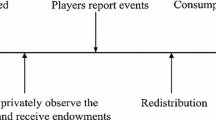Abstract
Earlier experimental work on public good mechanisms has focused almost exclusively on stability issues, finding that institutions with robust equilibrium stability properties were better at achieving their equilibrium. In this study, we continue to explore this insight and, in addition, look at issues such as out-of-equilibrium punishment and complexity. The experiment varies stability conditions and group size in two Nash efficient Lindahl mechanisms. These mechanisms have similar stability properties. However, when groups are large, they differ both in the severity with which they punish out-of-equilibrium behavior and their informational complexity. We examine how these differences impact mechanism performance.
Similar content being viewed by others
References
Afrifovic J, Ledyard J (2003) Computer testbeds: the dynamics of Groves-Ledyard mechanisms. Mimeo
Chen Y, Plott C (1996) The Groves-Ledyard mechanism: an experimental study of institutional design. J Public Econ 59: 335–364
Chen Y, Tang F (1998) Learning and incentive compatible mechanisms for public good provision: an experimental study. J Polit Econ 106: 633–662
Chen Y (2002) A family of supermodular Nash mechanisms implementing Lindahl allocations. Econ Theory 19: 773–790
Chen Y, Gazzale R (2004) When does learning in games generate convergence to Nash equilibria? The role of supermodularity in an experimental setting. Am Econ Rev 94: 1505–1535
Cox J, Walker M (1998) Learning to play cournot duopoly strategies. J Econ Behav Organ 36: 141–161
de Trenqualye P (1989) Stable implementation of Lindahl allocations. Econ Lett 29: 291–294
Fudenberg D, Levine D (1998) The theory of learning in games. The MIT Press, Cambridge
Healy P (2006) Learning dynamics for mechanism design: an experimental comparison of public goods mechanisms. J Econ Theory 129: 114–149
Healy P, Mathevet L (2011) Designing stable mechanisms for economic environments. The Ohio State University working paper
Hurwicz L (1960) Optimality and informational efficiency in resource allocation processes. In: Arrow KJ, Karlin S, Suppes P (eds) Mathematical methods in the social sciences. Stanford University Press, Stanford, pp 27–46
Hurwicz L (1979) Outcome functions yielding Walrasian and Lindahl allocations at Nash equilibrium points. Rev Econ Stud 46: 217–224
Kim T (1987) Stability problems in the implementation of Lindahl allocations. Doctoral thesis, University of Minnesota
Kim T (1993) A stable Nash mechanism implementing Lindahl allocations for quasi-linear environments. J Math Econ 22: 359–371
Kim T (1996) A stable Nash mechanism for quasi-additive public-good environments. Jpn Econ Rev 47: 144–156
Milgrom P, Roberts J (1990) Rationalizability, learning, and equilibrium in games with strategic complimentarities. Econometrica 58: 1255–1277
Namatame A, Tse E (1981) Adaptive expectations and dynamic adjustment in noncooperative games with incomplete information. J Optim Theory Appl 34: 243–261
Siegel C, Castellan J (1988) Nonparametric statistics for the behavioral sciences, 2nd edn. McGraw-Hill, New York
Van Essen M (2011a) A note on the stability of Chen’s Lindahl Mechanism. Soc Choice Welf (in press)
Van Essen M (2011b) A simple supermodular mechanism that implements Lindahl allocations. J Public Econ Theory (in press)
Van Essen M, Lazzati N, Walker M (2011) Out-of-equilibrium performance of three Lindahl mechanisms. Games Econ Behav (in press)
Vega-Redondo F (1989) Implementation of Lindahl equilibrium: an integration of the static and dynamic approaches. Math Soc Sci 18: 211–228
Walker M (1981) A simple incentive compatible scheme for attaining Lindahl allocations. Econometrica 49: 65–71
Author information
Authors and Affiliations
Corresponding author
Rights and permissions
About this article
Cite this article
Van Essen, M. Information complexity, punishment, and stability in two Nash efficient Lindahl mechanisms. Rev Econ Design 16, 15–40 (2012). https://doi.org/10.1007/s10058-011-0112-4
Received:
Accepted:
Published:
Issue Date:
DOI: https://doi.org/10.1007/s10058-011-0112-4




